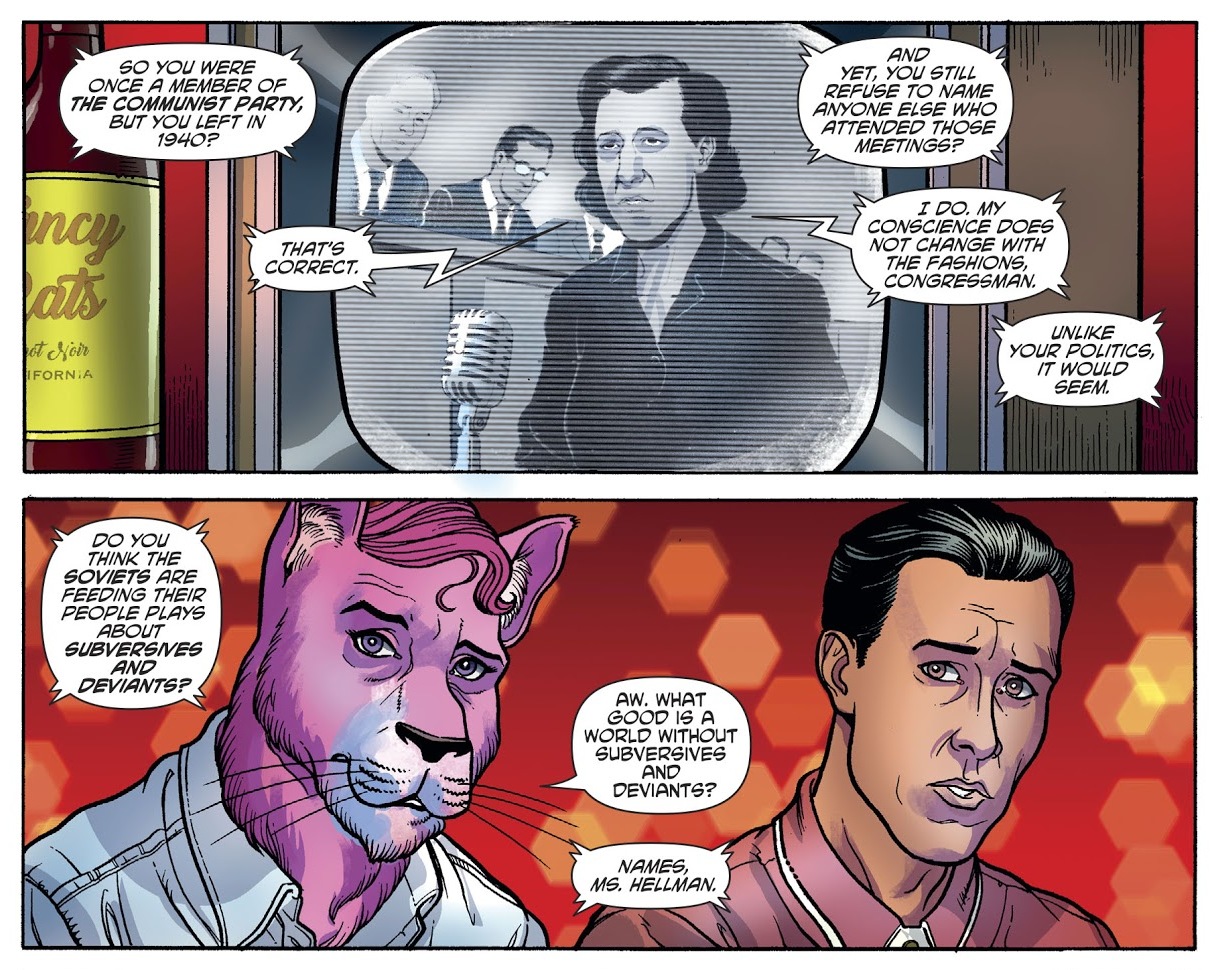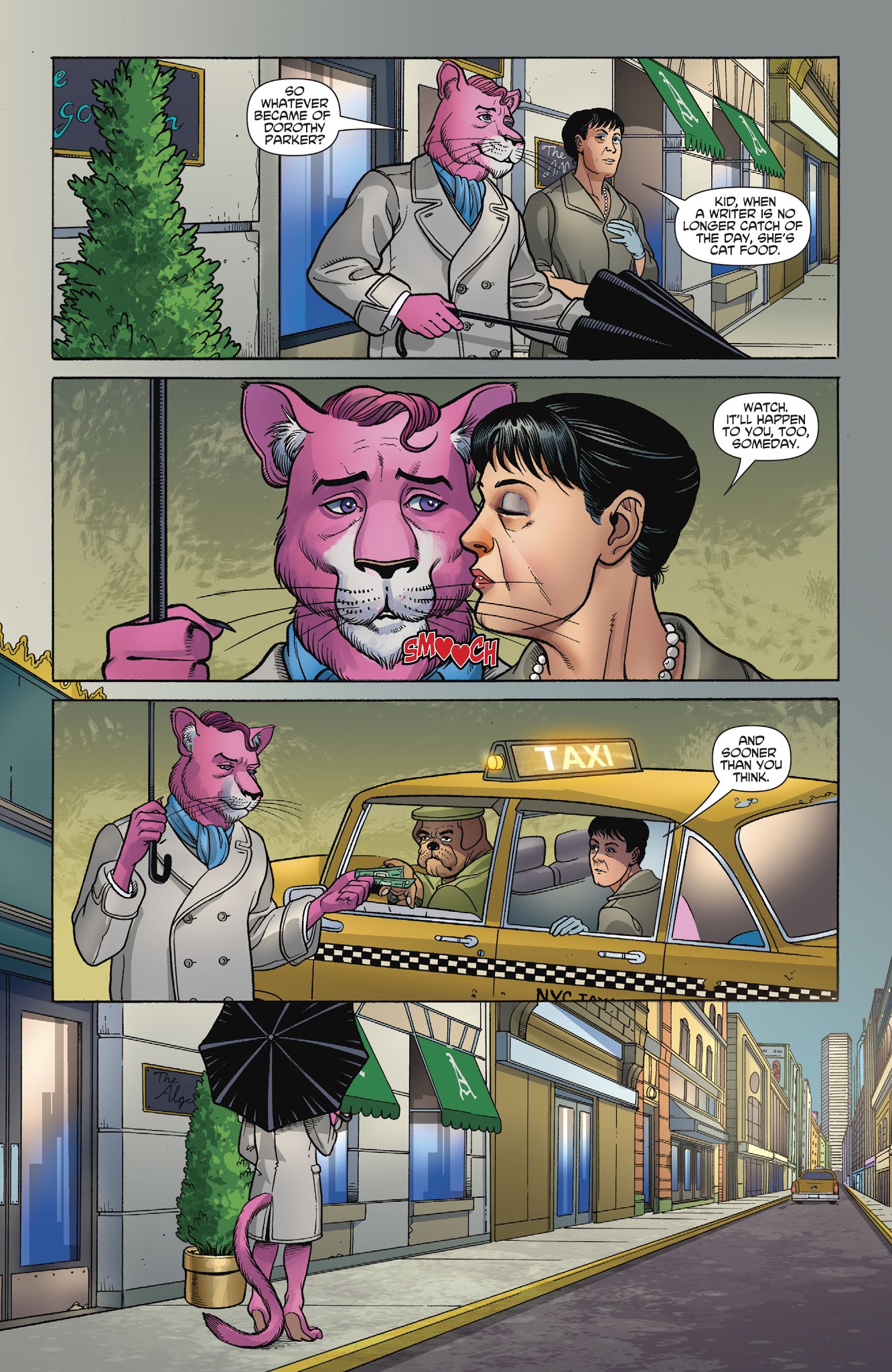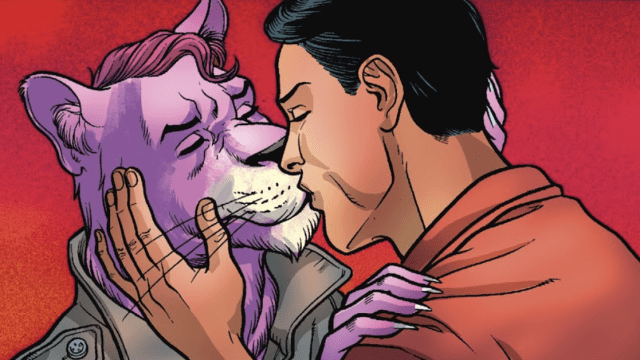Every time I’ve found myself explaining the basic premise of Mark Russell and Mike Feehan’s Snagglepuss: Exit Stage Left, people’s immediate reactions have been the same. At first, there’s light shock that DC would make a comic about a gay, closeted, anthropomorphic mountain lion and noted playwright. But then, after hearing more of the plot – how Snagglepuss becomes the newest target of the House Un-American Activities Committee’s crusade to oust subversive voices from Hollywood – their reactions shift.
Image: DC Comics
When you note that the book takes place in the early ’50s during the height of McCarthyism and the Second Red Scare, there’s a certain distance that’s easy to put between the world of the comic and our reality. (McCarthyism, named for US Senator Joseph McCarthy, is the practice of accusing others of treason or subversion without consideration for proof.) But while our reality may not be filled with walking, talking animals who are every bit the cultural tastemakers that we are, Exit Stage Left is, in fact, telling an all-too-realistic story about institutional bigotry that’s grounded in American history.

On the night of the final performance of Snagglepuss’ play “My Heart Is a Kennel of Thieves” on Broadway, all of New York City is abuzz with excitement and anticipation about what the writer will do next. After cutting through throngs of fans and paparazzi, Snagglepuss and his wife Lila Lion slide into their limousine and speed off into the night to chat with one another about their evening out on the town.
The crowd, Lila accurately points out, adores Snagglepuss. But the crowd, Snagglepuss accurately points out in response, doesn’t actually know anything about him. They know that the mountain lion, a native of Mississippi, grew up reading The New Yorker and revering members of the Algonquin Round Table such as Dorothy Parker, but they don’t know his true political affiliations or his heart. Wordlessly, Lila steps out of the limousine moments later and the car revs back up, taking Snagglepuss to a nearby gay bar (the Stonewall) to meet with his actual lover, Pablo.

Living this sort of double life is second nature for Snagglepuss – after all, he’s made a career out of building elaborate facades for the public’s consumption. But what Exit Stage Left is ultimately setting up in this first issue is that, as hidden away as he thinks he is, Snagglepuss’ very existence is a subversive act of defiance that will pull him even more squarely into the spotlight.
Exit Stage Left wastes no time in establishing its central villain in one Gigi Allen, a US State Department employee sent to assist HUAC in its mission to oust Communist sympathisers from within the country. Even as Snagglepuss foolishly tries to dismiss the House’s televised trials of public figures as a bloodthirsty spectacle for the small-minded, he can’t stop himself from picking up on the atmospheric change hinting at the storm coming his way.
In response to Snagglepuss’ refusal to take the House seriously, Pablo tells him the story of how he and other gay Cuban men once rolled their eyes at their government – a mistake that would ultimately lead to death for some and exile for others. Pablo’s story shakes Snagglepuss and sends him on an introspective journey that transports us into the mind of a man/mountain lion who knows, instinctively, that the shoe is about to drop – a novel way to tell a story about McCarthyism.

Like its Red counterpart, the Lavender Scare was an anti-Communist witch hunt that saw hundreds of innocent people fired from their jobs, but the Lavender Scare was unique in that it specifically targeted LGBTQ people, or those suspected of being queer. Even if people were not actually Communists, the idea was that queer people could be blackmailed by Communists or their sympathisers because of their sexual or gender identities. Of course, garden-variety homophobia underpinned the Lavender Scare’s structure, but the trappings of patriotism and service to one’s country made the initiative that much more palatable to the public.
Exit Stage Left is setting the stage for a story about just what it meant to be a victim of the Lavender Scare on a very human level. Often, when Americans talk about McCarthyism and the impact it had on their culture, they use broad, sweeping abstracts that gloss over the individual lives of people who were hurt. The anti-Communist panic of the ’50s wasn’t just a political movement that swept the nation, it was a series of lives inexorably altered or ruined by a politically-driven mass hysteria.
Snagglepuss: Exit Stage Left is trying to tell the story of one of those lives, in hopes of doing justice for more.

Comments
5 responses to “Snagglepuss: Exit Stage Left Is A Brilliant Exploration Of McCarthyism And The Lavender Scare”
This seems like an Onion article.
No it doesn’t.
Yeah it does and it’s getting pretty boring reading about the sad sexual interests of Kotaku staff.
The fact they actually look for this stuff shows they need to get out more.
They run an article on like every single comic that comes out and this is a DC comic book that is widely available.
Mature explorations/subversions of Hanna-Barbera properties are so hot right now in the wake of the Flintstones comic.
Thing is, I read a page of a Snagglepuss comic with this premise somewhere online, and it was awful. Deeply pretentious and pointless. The Flintstones worked because they kept the core of the Flintstones (50s sitcom families and anachronistic technology) and built on it in a way that commented on both. Snagglepuss vs McCarthy doesn’t need or benefit from Snagglepuss.